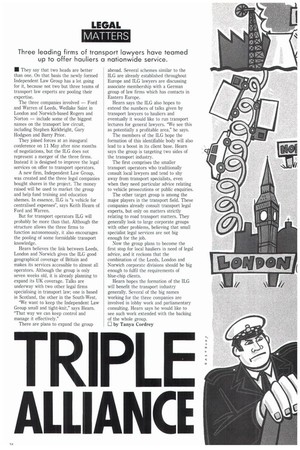Three leading firms of transport lawyers have teamed up to offer hauliers a nationwide service.
Page 36

If you've noticed an error in this article please click here to report it so we can fix it.
• They say that two heads are better than one. On that basis the newly formed Independent Law Group has a lot going for it, because not two but three teams of transport law experts are pooling their expertise.
The three companies involved — Ford and Warren of Leeds, Wedlake Saint in London and Norwich-based Rogers and Norton — include some of the biggest names on the transport law circuit, including Stephen Kirkbright, Gary Hodgson and Barry Prior.
They joined forces at an inaugural conference on 11 May after nine months of negotiations, but the ILG does not represent a merger of the three firms. Instead it is designed to improve the legal services on offer to transport operators.
A new firm, Independent Law Group, was created and the three legal companies bought shares in the project. The money raised will be used to market the group and help fund training and education shemes. In essence, ILG is "a vehicle for centralised expenses", says Keith Hearn of Ford and Warren.
But for transport operators ILG will probably be more than that. Although the structure allows the three firms to function autonomously, it also encourages the pooling of some formidable transport knowledge.
Hearn believes the link between Leeds, London and Norwich gives the ILG good geographical coverage of Britain and makes its services accessible to almost all operators. Although the group is only seven weeks old, it is already planning to expand its UK coverage. Talks are underway with two other legal firms specialising in transport law; one is based in Scotland, the other in the South-West.
"We want to keep the Independent Law Group small and tight-knit," says Hearn. "That way we can keep control and manage it effectively."
There are plans to expand the group abroad. Several schemes similar to the ILG are already established throughout Europe and ILG lawyers are discussing associate membership with a German group of law firms which has contacts in Eastern Europe.
Hearn says the ILG also hopes to extend the numbers of talks given by transport lawyers to hauliers and eventually it would like to run transport lectures for general lawyers. "We see this as potentially a profitable area," he says.
The members of the ILG hope the formation of this identifiable body will also lead to a boost in its client base. Hearn says the group is targeting two sides of the transport industry.
The first comprises the smaller transport operators who traditionally consult local lawyers and tend to shy away from transport specialists, even when they need particular advice relating to vehicle prosecutions or public enquiries.
The other target group is among the major players in the transport field. These companies already consult transport legal experts, but only on matters strictly relating to road transport matters. They generally look to large corporate groups with other problems, believing that small specialist legal services are not big enough for the job.
Now the group plans to become the first stop for local hauliers in need of legal advice, and it reckons that the combination of the Leeds, London and Norwich corporate divisions should be big enough to fulfil the requirements of blue-chip clients.
Hearn hopes the formation of the ILG will benefit the transport industry generally. Several of the big names working for the three companies are involved in lobby work and parliamentary consulting. Hearn says he would like to see such work extended with the backing of the whole group.
0 by Tanya Cordrey
















































































